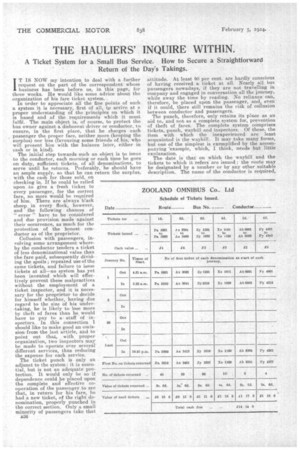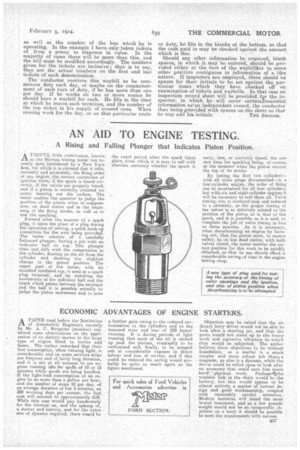THE HAULIERS' INQUIRE WITHIN.
Page 20

Page 21

If you've noticed an error in this article please click here to report it so we can fix it.
A Ticket System for a Small Bus Service. How to Secure a Straightforward Return of the Day's Takings.
IT IS NOW my intention to deal with a further request on the part of the correspondent whose business has been before us, in this page, for three weeks. He would like some advice about the organization of his fare ticket system.
In order to appreciate all the fine points of such a system it is necessary, first of all, to arrive at o proper understanding of the principles on which it is based and of the requirements which it must fulfil. The main object is, of course, to protect the bus owner against a dishonest driver or conductor, to ensure, in the first place, that he charges each passenger the proper fare, neither more (keeping the surplus) nor loss (favouring some friends of his, who will present him with the balance later, either in cash or in kind).
The initial step towards such an object is to issue to the conductor, each morning or each time he goes on duty, sufficient tickets, of all denominations, to serve until he returns. Preferably, he should have an ample supply, so that he can return the surplus, with the cash for those sold, on checking in. If he could be relied upon to give a fresh ticket to every passenger, for the correct
faret no more would be required of him. There are always black sheep in every flock, however, and the following chances of " error " have to be considered and due provision made against their occurrence, as much for the protection of the honest conductor as of the proprietor. Collusion with passengers, involving some arrangement whereby the conductor tenders a ticket of less denominational value than the fare paid, subsequently dividing the spoils; repeated use of the same tickets, and failure to issue tickets at all—no system has yet been invented which will effectively prevent these malpractices without the employment of a ticket inspector, and it is necessary for the proprietor to decide for himself whether, having due regard to the size of his undertaking, he is likely to lose more by theft of fares than he would have to pay to a. staff of inspectors. In this connection 1 should like to make good an omission from the last article, and to point out that, with proper organization, two inspectors may be made to operate over several different services, thus reducing the expense for each service.
The ticket punch is only an adjunct to the system: it is essential, but is not an adequate protection. It would only be so if dependence. could be placed upon the complete and effective cooperation of the passenger to see that, in return for his fare, he had a new ticket, of the right denomination, properly punched in the correct section. Only a small minority of passengers take that attitude. At least 90 per cent, are hardly conscious of having received a ticket at all. Nearly all, bus passengers nowadays' if they are not travelling in company and engaged in conversation all the journey, while away the time by reading. No reliance can, therefore, be placed upon the passenger, and, even if it could, there still remains the risk of collusion between conductor and passengers.
The punch, therefore, only retains its place as an aid to, and not as a complete system for, prevention of theft of fares. The complete system comprises tickets, punch, waybill and inspectors. Of these, the item with which the inexperienced are least acquainted is the waybill. It may take many forms, but one of the simplest is exemplified by the accompanying 'example, which, I think, needs but little explanation.
The date is that on which the waybill and the tickets to which it refersare issued ; the route may be designated by a number or by any other suitable description. The name of the conductor is required,
as well as the number of the bus winch he is operating. In the example I have only taken tickets of from a penny to sixpence in value. In the majority of cases there will be more than. this, and the bill must be modified accordingly. The numbers given for the tickets are inclusive; that is to say, they are the actual numbers on the first and last tickets of each denomination.
The conductor receives this waybill as he commences duty each day, or maybe on the commencement of each turn of duty, if he has more than one per day. If he works on two or more routes he should have a waybill for each. He fills in the time at which he leaves each terminus, and the number of the top ticket in his supply of unused ones. When ceasing work for the day, or on that particular route or duty, he' fills in the blanks at the bottom, so that the cash paid in may be checked against the amount which is due.
Should any other information be required, blank spaces, in which it may be entered, should be provided either at the foot of the waybillfior in some other position contiguous to information of a, like nature. If inspectors are employed, there should be spaces for their initials to be set against the particular items which they have checked off on examination of tickets and waybills. In that case an inspection record sheet will be provided kr the inspector, in which he will enter certaiatessential. information aerial independent record, the conductor then being.provided.with spaces on the sheet so that he may acid his initials. TFIE SKOTCH.




























